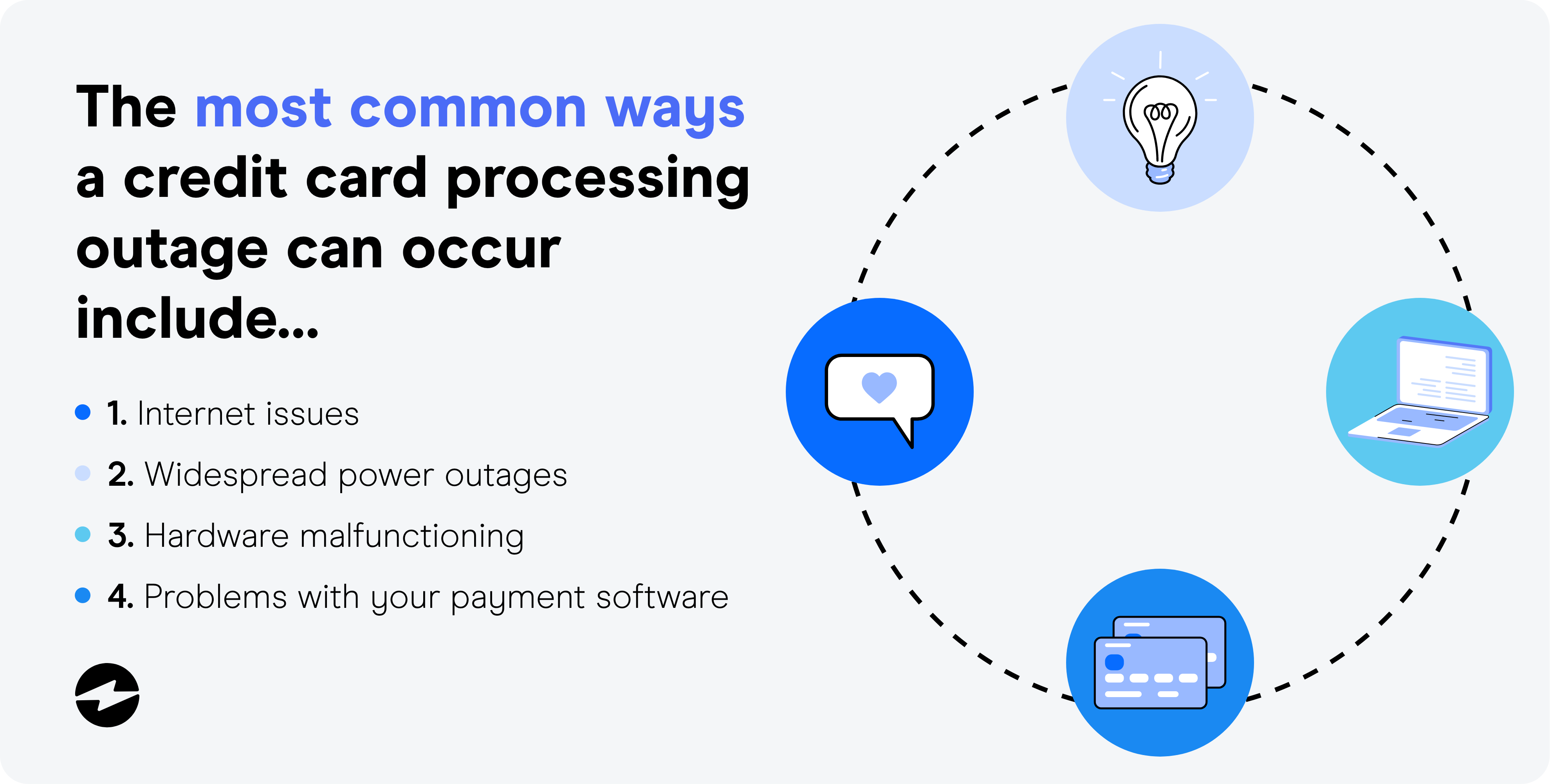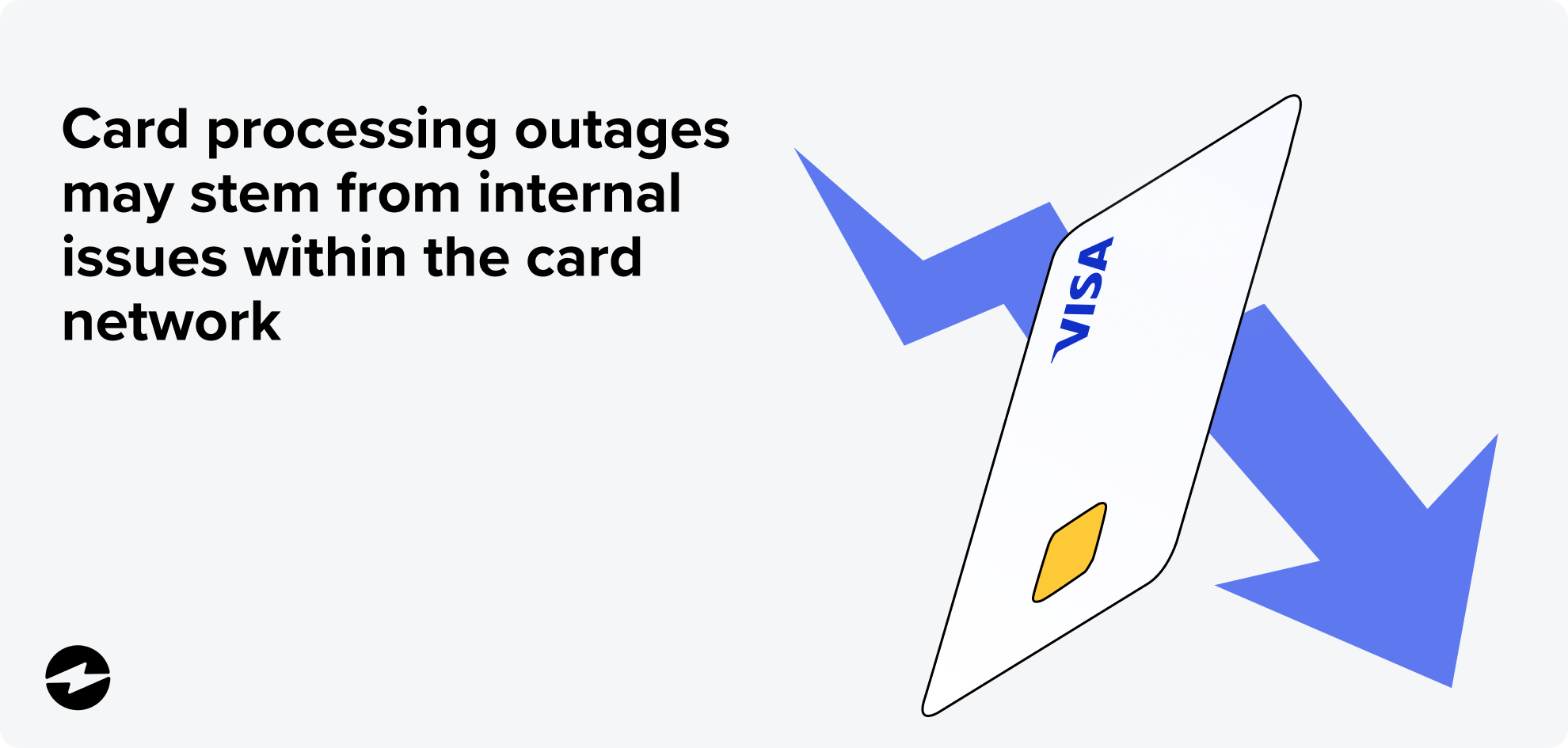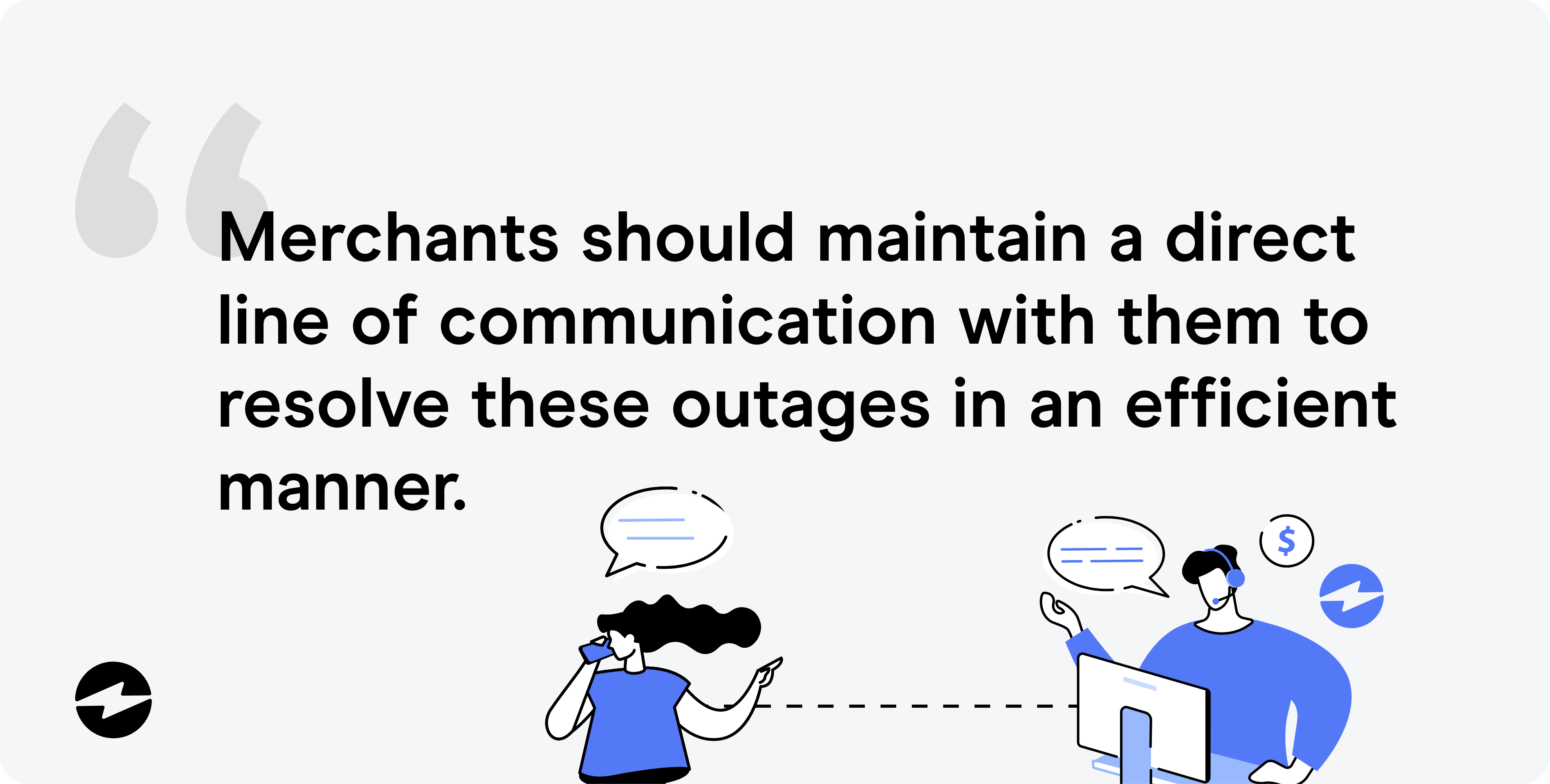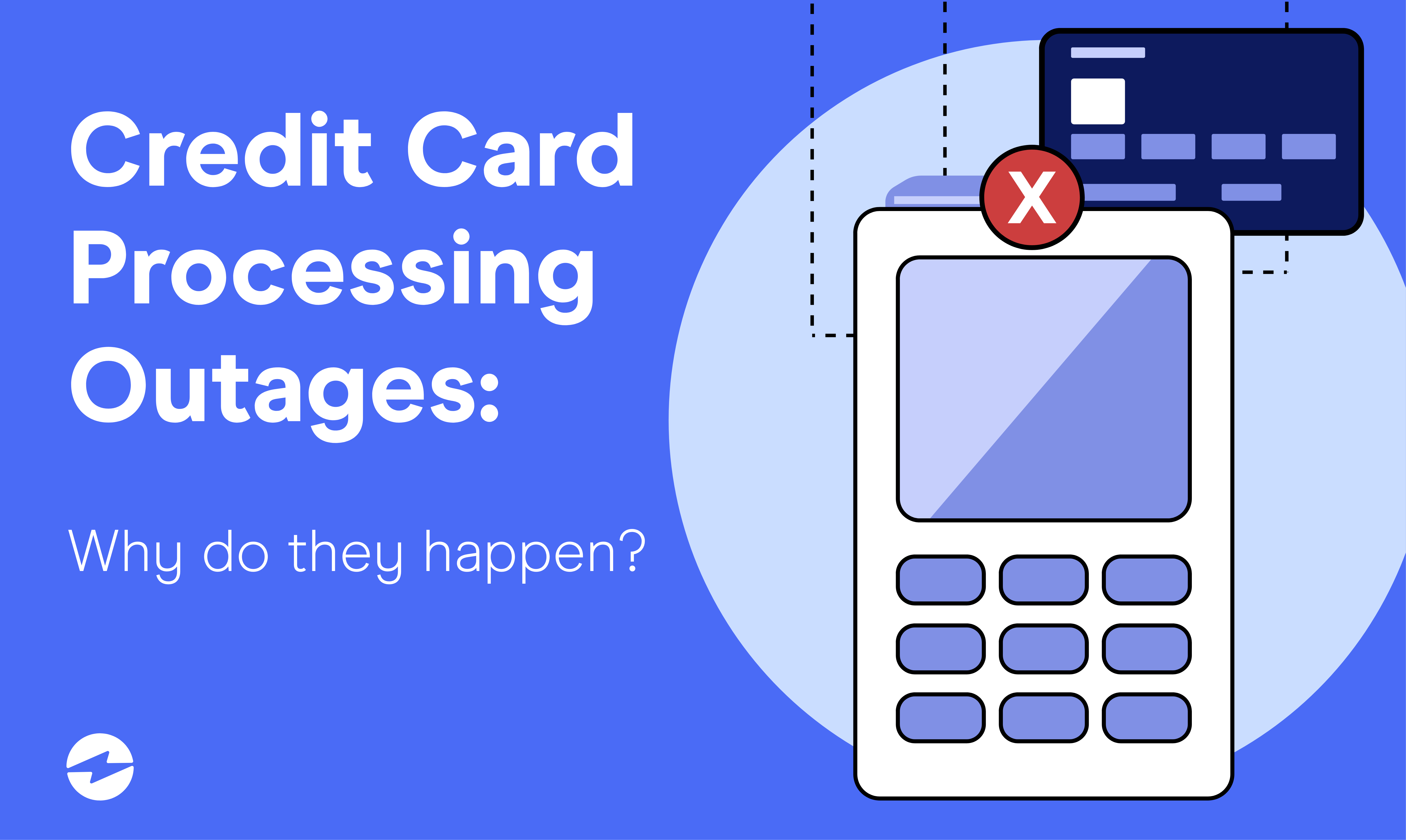Blog > Credit Card Processing Outages: Why They Happen & What To Do
Credit Card Processing Outages: Why They Happen & What To Do
While credit cards are one of the most preferred payment methods by consumers and businesses, this technology can still be subject to technical errors and processing outages.
Luckily, there are preventative measures, effective management strategies, and reliable security solutions that can help merchants properly address credit card outages to minimize damages.
Before you learn more about the tips and tricks to navigate system failures, it’s important first to understand what credit card processing outages are and why they can occur.
What is a credit card processing outage?
Businesses interested in accepting credit cards must invest in card processing systems provided by payment processors to transmit customers’ credit card data to their merchant accounts.
Credit card machines, online checkout systems, or other payment channels are required to properly operate card processing systems. Therefore, these systems can experience software disruptions, technical issues, hardware malfunctioning, and overall system failures known as credit card processing outages.
When a credit card processing outage occurs, your payment processing system may temporarily go offline, experience limited functionality, or stop working altogether which prevents your business from accepting credit cards until the issue is resolved.
How do credit card processing outages occur?
Credit card processing outages can occur for a variety of reasons that stem anywhere from regional power outages to internal functionality issues with your payment processor.
The most common ways a credit card processing outage can occur include…
- Internet issues
- Widespread power outages
- Hardware malfunctioning
- Problems with your payment software

Internet issues
Internet connectivity issues and blackouts are among the most common reasons why a credit card processing outage can occur. This is because an internet connection is required to transmit card data and process these transactions.
Credit card processing outages that arise from internet-related problems can sometimes be fixed with a quick reboot of your router or a call to your internet service provider or payment processor. Other times, the blackout may be a regional outage or much more widespread which can cause a nationwide credit card outage.
Widespread power outages
In addition to widespread internet outages, merchants that process credit cards are also susceptible to power outages in their area.
Power outages are often the result of inclement weather but can also occur due to downed power lines, grid issues, or even human errors. Unfortunately, credit card processing outages are typically unavoidable if the power goes down in your area.
Hardware malfunctioning
Credit card processing hardware such as point-of-sale (POS) systems and card readers can malfunction and trigger processing outages without experiencing any software issues.
Credit card machines may go out of service or be limited in their capabilities due to defective components, hardware that doesn’t properly sync with your software, damaged or worn card swipe readers, and other issues.
Problems with your payment software
Credit card processing outages can also be caused by payment software glitches or service interruptions.
With any payment processing software, merchants can encounter problems involving outdated technology, technical errors, or service outages due to an issue with their credit card processor. Thankfully, there are countless credit card processors to choose from to ensure you find the best and most reliable fit for your business.
Despite the various ways a credit card processor outage may occur, merchants should be proactive by incorporating effective strategies and protocols into their infrastructure.
What to do during a credit card processing outage
If your business does experience credit card processing problems or a full outage, there are several steps you can take to address and resolve these interruptions quickly.
Here are 5 things you can do to address credit card processing outages…
- Determine the root cause of the credit card processing outage
- Communicate with your payment processor and other parties
- Offer alternative or offline payment methods for customers
- Troubleshoot for hardware issues
- Use Down Detector for real-time notifications
1. Determine the root cause of the credit card processing outage
When a credit card processing outage occurs, merchants should immediately inspect their internal operations to determine the source of this outage.
Power outages are typically easier to pinpoint since they limit or disconnect your credit card processing system, as well as other operations. If the power is not the source of the outage, check your internet connectivity to ensure there are no WiFi disruptions.
Merchants can also investigate the source of their credit card processing outage by inspecting their routers and POS terminals to check their service connection, and reboot them if necessary.
Next, evaluate your credit card processing functionality to determine if the issue is at the processor level. Service outages may stem from your payment processor which can affect how you accept and process credit cards.
If your business still can’t pinpoint the source of its credit card processing outage, it may be wise to check the major card networks like Visa, Mastercard, American Express, or Discover, for reported problems. This means a processing outage is likely not causing the disruption. Instead, the network may be experiencing an internal credit card outage.

After determining the source of a credit card processing outage, merchants will have a better idea of the scope of the outage — if it’s only confined to their business, a local region, or if it spans across a wider area.
2. Communicate with your payment processor and other parties
Both internal and external communication are vital during a credit card processing outage.
Customers should be the top priority since they’re directly affected during credit card processing outages. To maintain rapport and avoid any dips in revenue, businesses should immediately notify customers when an outage occurs and actively work to provide other payment options for them. Incentives like discounts or gift cards can serve as an apology for the inconvenience.

Merchants should also regularly communicate with internal employees to resolve credit card processing outages quickly to minimize damages. This can include hourly check-in calls, troubleshooting meetings, email correspondence, and more.
Payment processors play an important role during credit card processing outages. Therefore, merchants should maintain a direct line of communication with them to resolve these outages in an efficient manner.
Your business may also need to contact other parties such as internet service providers, power companies, card networks, financial institutions, etc.
3. Offer alternative or offline payment methods for customers
Offering alternative payment methods for customers during a credit card processing outage will help your business avoid late payments, cash flow disruptions, and customer retention dips.
The most popular alternative payment methods include cash, physical checks, direct deposits, or digital payment channels like ApplePay and Venmo. Mobile applications may also be accessible during outages to allow customers to make payments on their devices.
Merchants can also incorporate offline options in case of a processing outage like lockbox banking or manual card imprinters. Card imprinters are typically considered an outdated payment method, but they can be a lifesaver for brick-and-mortar stores experiencing credit card issues or offline credit card systems.
To record purchases with card imprinters, employees must write in transaction details and use rollers and ink to imprint customers’ cards on a dedicated paper form. These transactions are then inputted into your payment terminal once it’s back online.
In the worst-case scenario, you can manually enter customers’ card information by writing it down during an outage and inputting it later. This option is not recommended since it goes against PCI Compliance standards and can pose a security risk to your customers.
4. Troubleshoot for hardware issues
During a credit card processing outage, merchants should always inspect their processing hardware to check for physical damages or defects that may be causing the outage.
Your credit card processing hardware should be checked for any glitches, damages, service-related issues, and more. If your credit card machine is not working, your team should ensure it’s up-to-date with the latest software and reboot the system to see if the issue is resolved.
When troubleshooting hardware, businesses should enlist the help of their credit card processors to assist with any malfunctions and provide additional equipment if necessary.
5. Use Down Detector for real-time notifications
In addition to the previous tips, Downdetector offers a valuable tool for merchants to receive real-time notifications that alert them if there’s a large disruption involving internet service providers, payment processing companies, or card networks like Visa and Mastercard.
Businesses should consistently monitor Downdetector during a credit card processing outage to gather more insight to determine if the incident is confined to certain parties like banks, processors, and ISPs, or if it’s more widespread.
While taking these steps to address and mitigate credit card processing outages is important, merchants should also understand the impact these outages can have.
The impact of credit card processing outages on your business
Credit card processing outages can greatly impact your business and its customers, especially if you don’t implement the proper precautions and mitigation protocols.
Merchants will often see the biggest impact from credit card processing outages in their cash flow and revenue. Since outages disrupt and disable businesses from accepting credit card payments, this can deter customers from making a purchase and returning in the future.
Some customers may blame your infrastructure for any software failures or hardware-related malfunctions which can damage your brand reputation and credibility. Businesses with poor mitigation strategies, a lack of backup equipment, and poor communication tactics may encourage more distrust from their customers.
Payment security can also be negatively impacted during credit card processing outages which is why it’s essential to ensure there are no gaps in your security systems and protocols to secure credit card data at all times.
Find a reliable credit card processor with robust payment security
To better prepare for credit card processing outages, merchants can work with a reliable credit card processor like EBizCharge for more robust payment security and 24/7 support.
Payment processors that maintain full PCI compliance and provide robust support can help merchants better secure their customers’ credit card data and troubleshoot disruptions to resolve credit card processing outages more efficiently.
Frequently Asked Questions
Frequently Asked Questions
Summary
- What is a credit card processing outage?
- How do credit card processing outages occur?
- Internet issues
- Widespread power outages
- Hardware malfunctioning
- Problems with your payment software
- What to do during a credit card processing outage
- Find a reliable credit card processor with robust payment security
- Frequently Asked Questions

